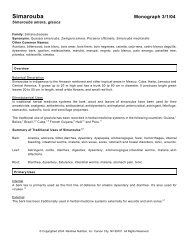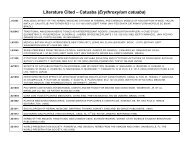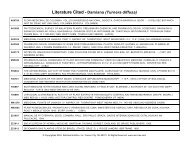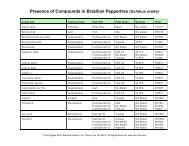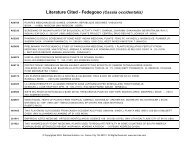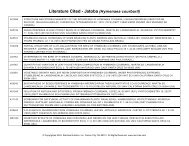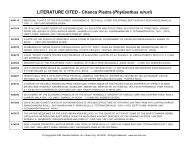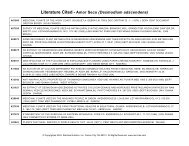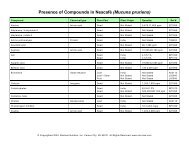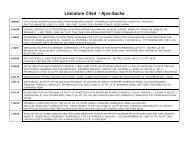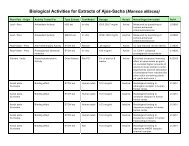Organ Specific Guide - Raintree Nutrition, Inc
Organ Specific Guide - Raintree Nutrition, Inc
Organ Specific Guide - Raintree Nutrition, Inc
Create successful ePaper yourself
Turn your PDF publications into a flip-book with our unique Google optimized e-Paper software.
BELLACO CASPI EXTRACT<br />
Description: Bellaco caspi is a tropical rainforest tree growing 8-16 meters in height with a tall, narrow,<br />
pyramidal crown. The bark and the latex of bellaco caspi tree has a long history of use among the Indians<br />
in the Amazon. <strong>Raintree</strong>'s bellaco caspi concentrated extract uses new and proprietary extraction methods<br />
to concentrate and preserve the active ingredients found in this rainforest plant. Concentration methods<br />
provide the equivalent of 500 milligrams of bark and resin per milliliter of extract.<br />
Traditional uses by organ or system: Immune/Lymphatic System: For lymphatic cleansing, inflammation,<br />
and infections. Reproductive/Hormonal System: For endometriosis, uterine fibroid tumors,<br />
menstrual irregularities and pain, ovarian cysts, and ovarian inflammation.<br />
Ingredients: 100% pure bellaco caspi bark and resin (Himatanthus sucuuba) extracted in distilled water<br />
and ethanol.<br />
Suggested Use: Take 60 drops (2 ml) 2-3 times daily or as needed.<br />
Contraindications: None reported.<br />
Drug Interactions: None reported.<br />
Synopsis of research: (Please the online Tropical Plant Database for Bellaco caspi for all cited<br />
research.)<br />
In Brazilian herbal medicine, bellaco caspi is considered analgesic, anti-inflammatory, antitumoral, antifungal,<br />
anthelmintic, aphrodisiac, emmenagogue, febrifuge, purgative, tonic, vermifuge, and vulnerary.<br />
Practitioners and herbalists in Brazil recommend it for lymphatic gland diseases and inflammation; female<br />
disorders such as endometriosis, uterine fibroid tumors, menstrual irregularities and pain, ovarian cysts<br />
and ovarian inflammation; cancerous tumors and skin cancers; digestion problems such as indigestion,<br />
stomachaches, bowel inflammation and gastric ulcers; general pain and inflammation (arthritis, rheumatism,<br />
and fractures); coughs, fevers, headaches, asthma and other lung disorders, and various skin issues<br />
such as wounds, ulcers, and rashes. Bellaco caspi is found in The Dispensatory of the United States of<br />
America which was published in 1918 and asserted febrifuge, anthelmintic and emmenagogue actions to<br />
the tree bark.<br />
A review of some of the chemicals found in bellaco caspi might explain some of the many traditional<br />
uses of this tropical rainforest tree. An antitumor iridoid compound and two depsides showing inhibitory<br />
activity of monoamine oxidase B (MAO-B) have been isolated from bellaco caspi bark. In addition, two<br />
iridoid chemicals called plumericin and isoplumericin have been found in the tree bark and the latex. These<br />
two chemicals have been reported with cytotoxic, anticancerous, antifungal, and antibacterial actions in<br />
laboratory research.<br />
In 2005, Brazilian researchers verified bellaco caspi's traditional use for stomach ulcers and digestion<br />
problems. They reported that an extract of the bark significantly protected rats from lab-induced ulcers and<br />
reduced gastric hypersecretion through several novel mechanisms of actions. The tree's long standing use<br />
for healing wounds was verified by Peruvian researchers in an animal study published in 1997. Brazilian<br />
researchers confirmed in 2000 that the latex evidenced significant anti-inflammatory and analgesic actions<br />
in laboratory animals which confirmed earlier anti-inflammatory research performed in 1978. They reported<br />
that bellaco caspi could exert anti-inflammatory effects even in the acute phase of the inflammatory<br />
process and attributed these effects to the cinnamate chemicals found in the latex and bark.<br />
In 2001, researchers in the United States reported that the bark of bellaco caspi was significantly<br />
cytotoxic in vitro to 5 different human cancer cell lines. They related this anticancerous action to the iridoids<br />
and triterpenoids in the tree bark. It also passed a brine shrimp assay which predicts anti-tumor activity in<br />
2003.<br />
Toxicity studies in laboratory animals indicate that the use of bellaco caspi at traditional dosages is<br />
non-toxic. Even when a bark extract was given to pregnant rats, there were no toxic, abortive, or birth<br />
defects reported.



